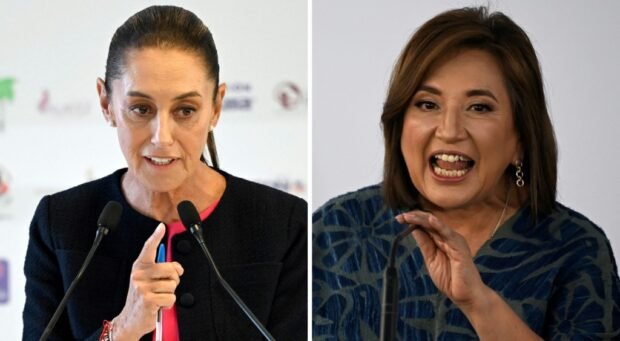Mexico City: The campaign to become Mexico’s next president reached its peak on Wednesday, with two women leading the race for the first time in the violent Latin American country.
If there had been no protests, a woman would likely have been elected leader of the world’s most Spanish-speaking country when millions of Mexicans voted on Sunday.
Left-wing ruling party candidate Claudia Scheinbaum and center-right opposition hopeful Xochitl Galvez, 61, are dominating the presidential race in a nation of racial inequality.
After nearly three months of official campaigning, Scheinbaum, a former mayor of Mexico City and an academic by training, has the support of 53 percent of voters, according to a poll by research firm Oracle.
His opposition rival, indigenous senator and businessman Xochitl Galvez, came in second with 36 percent.
The only way back was long-shooting center Jorge Alvarez Maynez, who had 11 percent.
On Wednesday, thousands of Scheinbaum’s supporters gathered in Mexico City’s main square to hear him speak, many wearing crimson, the color of Morena’s ruling party.
“The people have woken up.
Sheinbaum shares much of her popularity with her close ally and leftist Andres Manuel Lopez Obrador, who has an approval rating of more than 60 percent but is only allowed to serve one term.
Galvez chose the northern city of Monterrey for his closing rally.
“If Claudia (Sheinbaum) wins, she will be more like Lopez Obrador, who has drowned Mexico and wants to be another Venezuela,” said Bertha Diaz, 71, a supporter of Galvez.
Nearly 100 million people are registered to vote for the new president, members of Congress, several state governors and local officials in the largest public election in the country of 129 million.
After a wave of violence targeting local candidates, around 27,000 soldiers and members of the National Guard will be deployed to increase security on Election Day.
According to official figures, at least 22 people have been killed since last September in disputes over local authorities.
Some NGOs report higher figures, such as Data Civica, which states 30 murders of local politicians.
Criminal violence, which has killed more than 450,000 people since 2006, will be one of the main challenges facing the next president, as well as migration and managing fragile relations with the United States’ neighbors.
Sheinbaum vowed to continue Lopez Obrador’s anti-crime strategy, saying he was “hugs, not bullets,” a controversial strategy.
Galvez, who often tells stories of his childhood growing up in a poor, rural town in central Mexico, vowed to take a tougher approach, saying he was “done embracing criminals.”





















